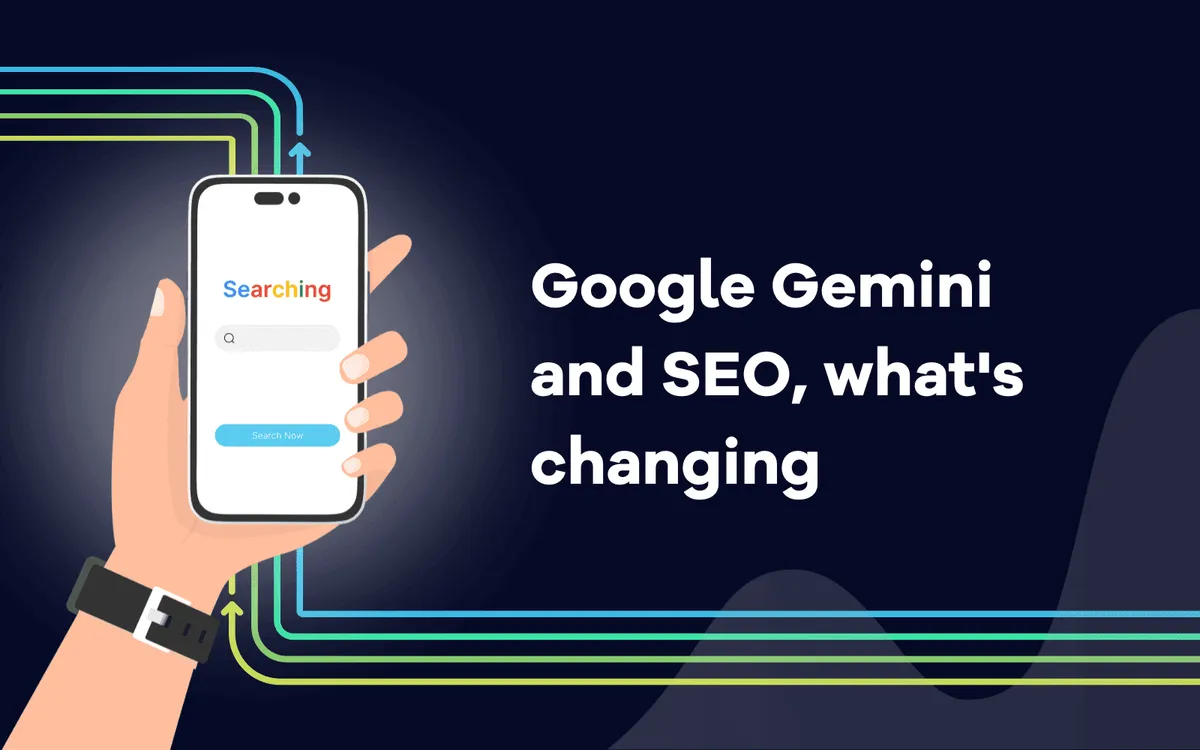
Google Gemini and SEO, what's changing

Giulio Stella
December 7, 2023
The power and development of this AI project could bring about changes in the SERP in the long run, and its use could open new perspectives for SEO professionals.

The race in AI continues to intensify between Google and OpenAI. While the latter released GPT-4 a few months ago, Google unveiled its "multimodal system" at the May 2023 Google IO conference: Gemini. Typically associated with the Gemini constellation or the second spaceflight, just before Apollo, in Google's project, it stands for "Generalized Multimodal Intelligence Network."
What do we know about Gemini
Google has reportedly given access to an early version of its Gemini system to a few companies. Overview of what has filtered about this “multimodal system”.
“Imagine if the Hulk of language models and Tony Stark’s AI Jarvis had a child… Boom!” This is Gemini. » Online, tech fans are full of praise for Google's generative artificial intelligence system, with many more or less happy pop culture references.
But how does the Gemini multimodal model work? What are its specificities? Does it deserve all the superlatives even before its release?
The previous ChatGPT would tend to convince us that the nuance would be more suitable: if OpenAI's generative model exceeded 100 million users as of January 2023 its attendance stagnated in May then began to fall in June. Furthermore, the OpenAI model is not without risk and has even shown some signs of regression.
According to Mountain View's firm, Gemini was designed to be "multimodal, highly efficient in integrating tools and APIs." It is expected to "enable future innovations, such as memory and planning."
Gemini Development
To develop this massive model, Gemini relies notably on the breadth and depth of data accumulated by Alphabet, through platforms like YouTube, Google Books, Google Search, and Google Scholar. It also utilizes cutting-edge training chips named TPUv5, purportedly the only ones worldwide capable of orchestrating 16,384 chips working together. Google's teams also trained the model using methods similar to those used in developing AlphaGo, a game more complex than chess. Additionally, unlike LaMDA, Google's large conversational language model trained through supervised learning, Gemini was trained through reinforcement learning like GPT-3 and GPT-4. This machine learning technique involves an AI agent learning to perform a task through trial and error in a dynamic environment.
According to The Information, several former members of Google Brain and DeepMind teams are currently working on the project, including Sergey Brin, Google's co-founder. Additionally, as per the same source, Google might introduce Gemini as either an update to Google Bard or the creation of a new chatbot before utilizing Gemini to power various products like Google Docs. Gemini might be released soon, possibly in response to OpenAI's upcoming GPT-4.5 release before GPT-5, expected around early 2024. "Once refined and rigorously tested for security, Gemini will be available in different sizes and capacities, much like PaLM 2," states Google, without further details.
A Potentially Shortened User Journey
Presently, Google SGE (Google's AI-enhanced search experience) is being tested in around a hundred countries. This version of Google offers AI-generated text, sources, and a conversational module. On certain queries, this search engine might reduce the number of user queries. According to an example from Exposure Ninja, a user seeking information about a "real estate lawyer" for a moving procedure might have only four site visits instead of eight with a traditional search.
 Source:Source exposure ninja
Source:Source exposure ninjaWhat happens if Gemini eventually integrates into SGE? "The costs associated with disseminating Gemini's responses in SGE initially mean that Google is not very inclined to provide Gemini-based SGE results unless they're necessary," cautions Tim Cameron-Kitchen, founder of Exposure Ninja.
In the case of Gemini's deployment in SGE, the multimodal system's ability to anticipate users' presumed needs could further reduce the search phase. Utilizing Gemini could provide direct responses in search results to the user's next questions. In the earlier example, this might create a search journey with only three sites to visit, according to Exposure Ninja.
 Source: Source exposure ninja
Source: Source exposure ninjaThis use of Gemini in SGE could also bring, according to Tim Cameron-Kitchen, "fewer duplicates, better-structured answers that logically follow the searcher's path, and better integration of multimodal capabilities." It's worth noting that, for this digital marketing expert, the potential reduction in site visits might be balanced by the fact that links are still present in the generated responses, and people continue to make purchases from sites via Google.
Potential applications of Gemini
Gemini has the potential to be used in a variety of applications, including:
Chatbots: Gemini can be used to create more sophisticated and natural chatbots. Gemini-based chatbots could be used to provide customer service, answer questions, or even just hold a conversation.
Text summaries: Gemini can be used to generate more accurate and concise text summaries. Gemini-based text summaries could be used to help people understand long articles or documents.
Creative Content Generators: Gemini can be used to generate creative content, such as poems, scripts, or music. Gemini-based creative content generators could be used to create new forms of art or entertainment.
Machine learning applications: Gemini can be used to improve the performance of machine learning applications. Gemini could be used to train more accurate and powerful machine learning models.
How we can use Google Gemini AI
Sundar Pichai, CEO of Google Alphabet, highlighted during Google I/O 2023 the advancements being made in making generative AI more user-friendly. Among these advancements are PaLM 2 and Gemini. DeepMind's Gemini is specifically crafted to be multimodal, allowing it to comprehend diverse data types like text, images, and code. This versatility enables it to excel in several tasks:
Generating various types of text, translating languages, and creating diverse creative content.
Processing data formats such as graphs and maps.
Leveraging a vast knowledge base derived from extensive training on text and code datasets.
Facilitating the creation of new products and services.
Analyzing data and recognizing patterns.
Providing informative responses to complex or unconventional questions.
Although Gemini's multimodal processing capability is still in progress, it holds the potential to revolutionize human-computer interactions. Its applications might range from crafting more realistic and engaging virtual assistants to innovating educational tools and enhancing our understanding of the world. For more details on Google's Gemini AI, including its workings, standout features, and more, keep exploring.
How does Gemini function?
Gemini operates as a multimodal AI system, capable of processing various types of data such as text, images, and code. It leverages extensive training on a massive dataset of text and code, allowing it to comprehend and generate these different forms of information.
At its core, Gemini employs advanced algorithms and models developed by DeepMind to understand and interpret data in multiple formats. By training on diverse datasets, Gemini learns patterns, structures, and relationships within the data, enabling it to perform tasks like generating text, processing visual information like graphs and maps, and analyzing complex datasets.
Its multimodal capabilities allow Gemini to handle different types of information simultaneously, facilitating tasks that involve multiple data formats or sources. This versatility is what positions Gemini as a potentially transformative tool, capable of revolutionizing how we interact with computers and process information across various domains.
Training and Connection
For SEO professionals, it will likely be essential to harness Gemini's potential fully. "If DeepMind's promises hold true and Gemini meets the presented criteria, it will become an essential tool for every SEO," suggests Giulio Stella, SEO consultant at Gstarseo "We'll need training to use it cautiously to enhance our results." It's worth noting that, according to The Information, developers would need to pay to access Gemini through Google Cloud server leasing.
There could be numerous aids for SEO professionals, especially through Gemini's connectivity. "We could ask it to load information from Google's tools," proposes Laurent Jean. "For instance, connecting Google Search Console, YouTube, and Google Sheets, from which we could retrieve lists of positioned keywords. We could also ask Gemini to provide a list of performing URLs with associated keywords. We could task it with creating classifications or lists of content to supplement by drawing from Google Sheets and YouTube. It's about utilizing LLM's capabilities to generate user-optimized text while leveraging Gemini's data and reasoning to reintegrate external data for SEO optimization."
Related blog posts

5 LLM Visibility Metrics You Should Track in 2026
SEO is now both about ranking in search engines and being visible in LLMs. We give you five visibility metrics every SEO should track in 2026.
3 December 2025Is LLM Tracking Relevant for You?
LLM tracking is not just for SEOs. It is also relevant for content teams, agencies, marketing leadership, and communication teams. Learn why here.
26 November 2025
How to Find the Best Prompts to Track for AI Visibility
Do you want to start tracking prompts to optimize your AI visibility? We give you seven practical ways to identify relevant prompts to track in LLMs.
9 November 2025
